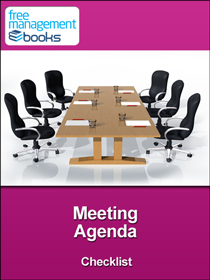Meeting Agenda Checklist
 |
||
 |
||
This Meeting Agenda checklist outlines the five key areas you need to address to produce an effective agenda.
Your employees and advisors can come to view every meeting as an exercise in tedium and futility. After a while, even you will struggle to harbor any excitement while asking them to join you in the conference room. There are many reasons why participants begin to feel bored and lose interest. An unfocused discussion or just a lack of inspiration and engagement, they think that nothing good is coming out of it so they aren't willing to put much effort into it. Regardless of the issue under discussion, a positive outcome is necessary to justify the time and resources that go into conducting the meeting.
A research paper stated that the average number of meetings a professional has to attend monthly is over 60. That is two meetings per day! If they don't turn out to be successful and effective, you will have ended up wasting your time and the time of all those who participated. This is something you can prevent through effective preparation. Preparation enables you to formulate a proper action plan to follow and keep the discussion on track throughout. In short, preparation is the key to successful and effective meetings.
![]()
![]()
Here are some steps you can follow for perfect preparation.
Define the Purpose
There has to be a specific purpose for bringing everyone together. You have to realize that your employees have a lot on their plates already and cannot be wasting time over meetings that don't produce any results. This is why you need to define the purpose. You have to be clear in your mind about the purpose as well as the goals you want to achieve through the meeting.
Make an Action Plan
To keep the discussion focused, it is imperative that you have an action plan laid out well in advance. The plan should include the reason for the meeting and what you hope to gain out of it. Most importantly, you need to define the nature of the discussion as well. Are you going to invite debate or just want to clarify something to the participants? Moreover, will you be the only one making the decisions or a common consensus has to be sought? You will need to guide the meeting according to what you want to achieve through it.
Communicate
There is no doubt that communicating effectively with participants during the meeting is important, but you also have to communicate that a meeting will take place. A notice in advance lets participants prepare as well. You are not the only one who will bring something to the table. They need time to think about the agenda as well as confirm their availability. Make it clear on the memo or any other communication you send whether the meeting is optional or attendance is compulsory. Notifying 48 hours in advance is sufficient.
Be On Time
Punctuality is also a key factor for making a meeting effective and successful. You are the one who is going to be leading so make sure you are on time. Also, set the time according to the participants' schedules so they are able to attend without any hassle. One thing you must do is start on time. Sometimes managers decide to wait a few minutes for everyone to arrive. This is something you should avoid doing, so start promptly. You are not bound to wait for anyone as long as you communicated effectively.
Stay On Track
Always ask participants to switch off their cell phones or any other devices they might be carrying. Nothing breaks the tempo of a meeting more than a cell phone ringing in the middle of it. Stay in control of the discussion. If anyone puts forth a different viewpoint or tries to take the discussion in another direction, you should simply state that 'we will discuss this next time' and get on with the agenda at hand.
Before dispersing, let the people who attended know when the next meeting will take place. Make it clear that you want to follow up on the agenda so that the attendees can prepare for it. So, these are some of the steps you can follow to prepare for your meetings. Doing so improves the chances of the meeting turning out to be effective and successful.


